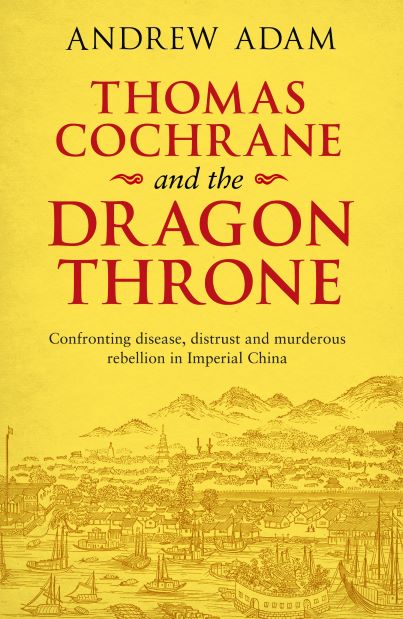We use cookies to make your experience better. To comply with the new e-Privacy directive, we need to ask for your consent to set the cookies. Learn more.
Brave New Year
Andrew Adam, author of Thomas Cochrane and the Dragon Throne, blogs for us about the Chinese New Year.
This February sees the start of the largest annual mass migration on earth. Over a period of three weeks 800 million members of one species will undertake innumerable journeys. What are they? Not myriads of birds or African fruit bats, but Chinese workers joining their loved ones for the Chinese New Year. In 2015 over 100,000 travellers were stranded by deep snow at Guangzhou railway station.
It was not like that in the days of the Chinese Empire. Its ancient agricultural society was conservative and static and relatively few journeys were made. The New Year was a religious ceremony, a time to visit the temples with offerings, to worship the deities and to revere ones ancestors. People measured their horoscopes against the new Zodiac sign. They adapted their plans to be assured of feng shui and good fortune.
One year, 1900, stands out in particular because it was the Year of the Metal Rat. The rat is the first of the creatures in the Chinese Zodiac system, noted for its cunning, boldness and adaptability. Metal rats have the power to turn disasters into triumphs.
The astrology of the Chinese New Year undoubtedly fuelled the terrible violence of the Boxer rebellion in 1900. It was a popular uprising against the presence and influence of the iang kuei-tsi or ‘foreign devils’, particularly Christianity. The uprising devastated the north-eastern provinces and cost the lives of 30,000 Chinese Christians, including many indigenous pastors and evangelists. Nearly 300 foreign missionaries were also slaughtered, most of them British. In human terms it was the greatest disaster in missionary history. The Boxer fanatics also destroyed schools, chapels, hospitals, dispensaries and orphanages. They scattered the bricks and trampled the ashes so that no vestige of them was left.
I describe these events in my book Thomas Cochrane and the Dragon Throne. Such a monumental calamity poses a question: what would you expect to happen to Christian faith in the aftermath?
The answer was first given by Tertullian, an early Christian author who was no stranger to persecution. ‘The blood of the martyrs is the seed of the Christian church,’ he famously wrote. And so it proved in China. Virtually all the missionaries who escaped the Boxers returned to their stations. Churches and schools were rebuilt, larger and better than before; the number of converts multiplied hugely and 1900-1925 became ‘the golden age of Chinese Christianity.’ At one point it was nearly adopted as the official religion of the republic.
1925 was a highwater mark. Then warlords, political strife, the Japanese invasion, the apocalyptic civil war between Nationalists and Communists (1927-1950) and the Cultural Revolution (1966-1976) blighted Christian hopes. By 1952 all the missionaries had been expelled, condemned as the lackeys of imperialism and the enemies of the people. It was a sad and reluctant exodus.
Nearly seventy years later, amazing changes have taken place in China, most of them beneath the surface. The government remains atheist and persecuting, but there has been staggering growth in both the official church and the underground church. Between 1975 and 2010, the number of evangelical Christians grew from 2.7m to over 75m. Today there are probably more than 200 millions. Tertullian’s saying holds true.
Back to the Chinese New Year in 2019. The lion and dragon dances, the lantern festivals and the firework displays will be larger, noisier and more expensive than ever. This is the Year of the Pig and babies born this year will (they say) lead fortunate lives, which I find strange since pigs end up in the cooking pot. They are smart but lazy and do not scheme. They may bring you prosperity, but you have to work at it. So now you know.
The Chinese New Year has been renamed the Spring Festival; it is overwhelmingly secular and its focus is entirely on the family. It also remains saturated with pagan superstitions and the pursuit of material possessions. When you think about it, that is just what the world has done to Christmas and Easter.
Some reports say that the youngsters in China’s teeming cities are losing interest. When the businesses close and the factories take a holiday, they are content to chill out, go partying, watch videos or play on-line games. But whether they are young or old is not the point. The spiritual thirst of a nation cannot be satisfied for ever by a cocktail of superstition, materialism, consumerism, digital technology and ‘good luck.’
So long as the Communist regime can deliver an ever-increasing standard of living to a population of 1.4 billion, and is able to provide them with bigger and better cars and nicer homes and digital wonders every single year, it may distract them from spiritual and political freedom. But when the magic of materialism fails, as it undoubtedly will do, look out! China’s sleeping giant will astound Christian believers around the world.












